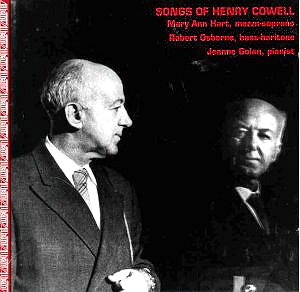These
songs span virtually the whole of Cowell's musically productive
life from 1914 to three years short of his death.
Cowell,
though an experimenter and dissident of the Ornstein stamp, wrote
in a fairly orthodox language especially in the songs from the
teens of the last century. He is more ethereal than Carpenter
(featured in a parallel Albany collection) with the music describing
the swirling pearlescence of William Baines - the aural analogue
of Virgil Finlay’s line drawings. There is about this writing
something of the atmosphere of Abraham Merritt’s ‘The Moonpool’
and ‘The King In Yellow’. Cowell’s choice of poetry however is
from among the greats and second rank such as Colum, Blake, Chesterton,
Frost, Millay, Meredith, Shelley and Pound.
Osborne's
sturdy yet sensitive range is fully tried and tested. His vocal
character lies somewhere between the young Benjamin Luxon (before
the onset of that beat in his voice) and the golden ‘heldentone’
of Brian Rayner Cook. Hart and Golan are also excellent.
The
St Vincent Millay song, with its sepulchral dissonances, is a
strange and most striking piece and an axle-turn from Manaunan's
birthing which is a conventional ballad. How Old Is Song?
dates from 1931 and has slashes across the piano's exposed strings
- an ethereal and still conjuring. Note the wandering tonality
of the Mother Goose set. Two years later and there is a
no-messing clangour in the piano part. The voice begins to lose
its balladry heroism substituting the delusion and nightmare of
Barber's Dover Beach. It is heavy with cataclysm. There
is an ululation and a drifting out of focus as darkling armies,
dissolute and with eyes rolling, pass by in grim parade. 1944
and The Pasture (Frost) sees a return to simplicity. This
might almost be Copland in Tender Land vein. Spring
Pools, another Frost setting, has the innocent daisy-pied
quality found in Moeran’s Shakespeare quartet. Chesterton's famous
blessed and reviled Donkey is taken sing-song at first
but grows subtle and caustic on the words monstrous head and
sickening cry. The jangling Mice Lament is to words
by Ella Grainger. Percy employed Cowell as musical secretary after
his release from San Quentin prison.
Albany
are owed thanks for printing the words of all the songs. I do
not underestimate the grief and annoyance that must go with getting
all the necessary waivers and permissions.
One
of Albany USA's few blindspots lies in its failure to see the
convenience of giving birth and death years of the composer on
the back of the jewel case; a minor cavil, of course in the face
of such an imaginative and revealing anthology.
Rob
Barnett

